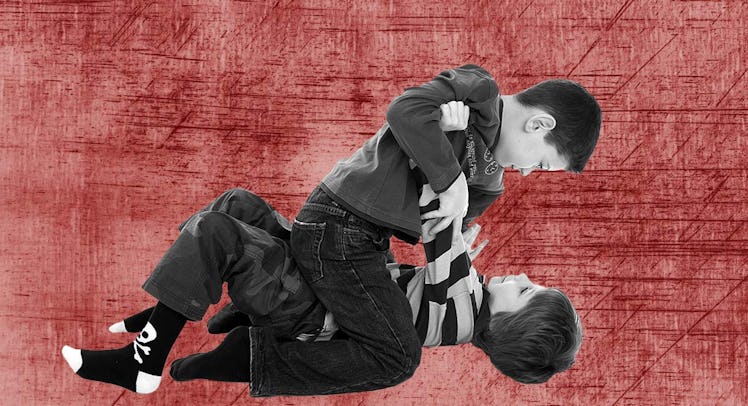Why Boys Love Roughhousing (And Why Parents Should Let Them Be)
Trading punches and pain is a natural form of boundary testing and can be healthy. But painful games can get out of hand.

Slug bug. Trading punches. Eraser burns. Kids have a tendency towards strangely masochistic play. These games treat self-harm as fun and they’re a particular hallmark of the schoolyard. Boys, in particular, are prone to smashing each other’s knuckles, slapping the backs of one another’s hands or otherwise trading pain. Many parents shrug off the behavior as just something kids do. But that’s only partially true. Rough physical play can be a part of normal development — up to a point.
“If you watch an animal behavior in general — lion cubs, monkeys — there’s that ongoing physical play,” explains Dr. Carla Marie Manly a clinical psychologist who’s worked extensively with elementary and middle school children. “We like to think we are so far beyond our animal instincts but we aren’t.”
Manly explains that much of the rough play can be linked to the animal urge to test physical boundaries and learn cause and effect. After all, with every passing year, a kid’s body can do something more, or something new. It makes sense to test those abilities, even if testing those abilities (endurance for instance) becomes painful. In part because of this, games that hurt can also act as self-made rites of passage, Manly adds.
“In other cultures, we have had small rites of passage that allow children to know when they are graduating from one stage to another,” she says. “Some of what they’re doing is figuring out, in their own ways, certain rituals, and rites of passage.”
And there’s a reason these rites of passages, particularly between American boys, might default to rough physical activity. Manly points out that in almost every corner of media and culture supports the idea that men engage through physical contact. While girls are largely seen as chatty and aloof, boys bash each other in football, wrestle, and otherwise knock each other around. “Even if you’re very careful about media, children will be exposed to these models,” Manly says. “If not at your house then at a friends house.”
None of this kind of play is a particular problem when there is a balance, says Manly. She notes that, at least at home, children are allowed a wide range of physical expressions with one another, from cuddling to roughhousing. “There’s a healthy balance. One is not necessarily favored consciously or unconsciously over the other. It’s a blend,” she says. But that balance is thrown off when a child is outside of their home. “When you move to American schoolyards that blend is not there, because the culture does not allow that blend.”
Which means that friends who might hug, or hold hands as men in other cultures do, tend to begin expressing themselves in more culturally accepted and violent ways. And this is where painful play often crosses the line from harmless boundary testing to problematically coercive and inappropriate.
Interestingly, there is another reason animals play rough with one another: establishing sexual dominance. Sexual play often takes the form of challenges made and accepted — mate competition essentially — played out until one party bows out, bruised, bleeding and lowered in social standing. And while this isn’t precisely the motivation behind painful, self-harm playground games, it provides a tidy parallel.
Many children enter into these games as dares and challenges. And that places the behavior on the razor’s edge of bullying. After all, a kid is being challenged. But is a child who consents to having an eraser rubbed across his skin until it burns or engaging in a sort of battle he’s likely to lose being bullied?
“It might not be technically called bullying if both are willingly engaged in the behavior,” Manly says. “But just because two people are engaging in activity by mutual consent doesn’t mean it’s healthy. We want to teach our children that we can express other emotions than anger and aggression and that we can play and fun and healthy ways where physical and emotional pain aren’t and ends result.”
Manly notes that adults need to be hyper-aware of motivations and reactions to this kind of masochistic play. She notes that anytime a child finds themselves under emotional or physical duress, a line has absolutely been crossed.
“Sometimes a person does not realize that he or she is being bullied at the moment because they are so eager to please — so eager to be part of the game. They’re doing what needs to be done to be accepted. That’s called survival,” Manly says. “It might not be till weeks days or years later that the person realizes they were being bullied.”